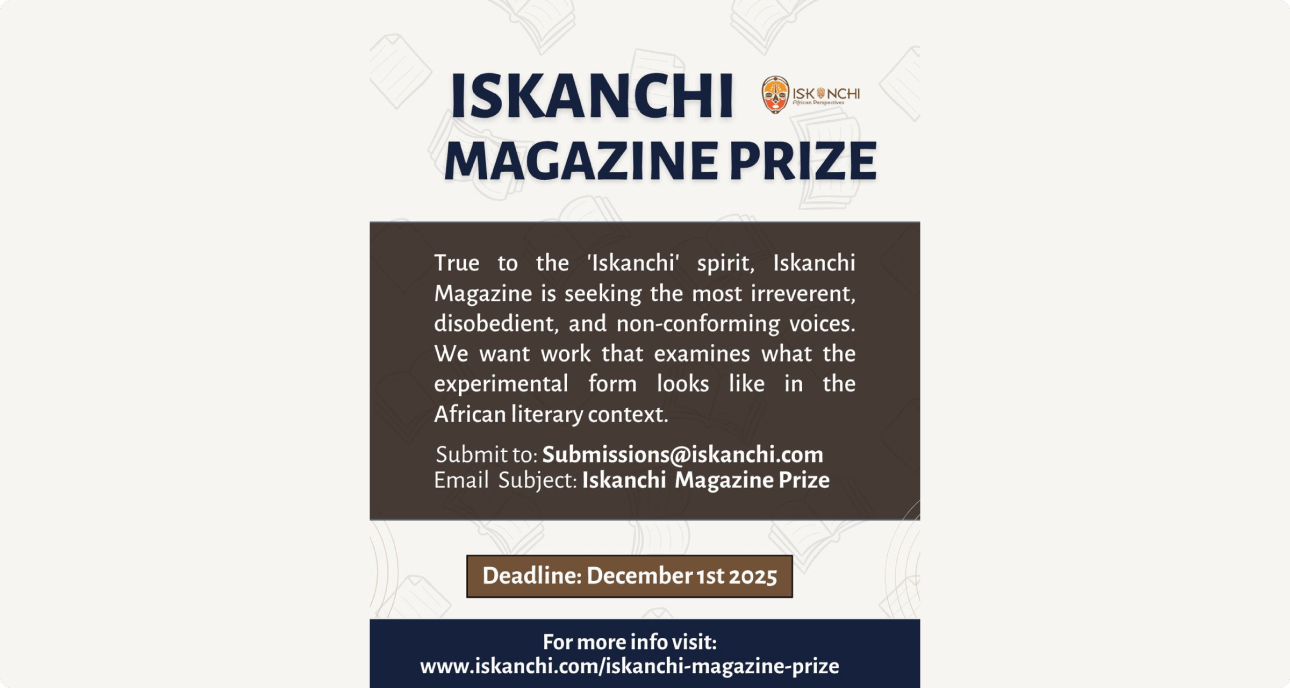We're not looking for polite literature.
The Iskanchi Magazine Prize isn't for writers seeking validation from the literary establishment. It's not for those who believe good writing means staying within the lines or translating African experiences into digestible packages for global consumption.
This prize is for the rebels. The rule-breakers. The ones who understand that sometimes the only way to tell the truth is to shatter the form that contains it.
What We Mean by "Irreverent, Disobedient, and Non-Conforming"
These aren't buzzwords. They're a commitment.
Irreverent means refusing to bow to literary conventions that no longer serve us. It means questioning inherited structures and asking: whose rules are these? What becomes possible when we break them?
Disobedient means resisting the pressure to make African literature palatable or easily categorized. It means writing that doesn't explain itself, doesn't apologize for its complexity, doesn't flatten its cultural specificity for the comfort of outsiders.
Non-conforming means exploring forms that challenge what a story, poem, or essay can be. Narrative structures that fracture and reassemble. Language that bends and breaks. Work that insists on its own terms.
The Problem with "Accessibility"
Let's talk about a word that haunts African writers: accessibility.
"This is brilliant, but it's not accessible enough."
"Can you explain this cultural reference?"
"Would a Western reader understand this?"
The subtext is always the same: make yourself smaller. Translate yourself. Become legible to the dominant literary culture.
But accessibility is not a neutral value. It's often a euphemism for assimilation. For flattening. For the erasure of specificity in service of a mythical "universal" reader who somehow always seems to be Western, white, and unfamiliar with anything beyond their own cultural context.
We want work that centers African perspectives without explanation. Work that assumes knowledge rather than translating it. Work that understands specificity is a strength, not a limitation.
What Real Experimentation Looks Like
Experimentation isn't about being difficult for difficulty's sake. It's about finding the form that serves the truth you're trying to tell.
Sometimes that means:
- Fractured narratives that mirror fractured histories and interrupted memories
- Multilingual texts that let Swahili, Yoruba, Amharic, Wolof exist without italics or translation
- Hybrid forms that blend poetry and prose, essay and fiction, oral tradition and contemporary innovation.
- Structural innovations that challenge linear storytelling—because not all truths are linear.
- Voices that multiply and contradict, refusing singular perspective or easy resolution
African literature has always been experimental. Our oral traditions blend time, perspective, and reality in ways that would be called "postmodern" if they weren't ancient. The Iskanchi Magazine Prize simply makes space for that innovation to flourish without apology.
What We're NOT Looking For
Let's be equally clear about what doesn't interest us:
- Experimentation without purpose —Breaking form just to break it
- Shock value masquerading as boundary-pushing — Violence or trauma deployed for effect rather than explored with depth
- Exoticism dressed as experimentation — Work that performs "Africanness" for a presumed outside gaze
- Safe narratives in experimental clothing — Conventional stories with unconventional formatting
- Work that explains African contexts as if for outsiders — If your narrative includes "In my culture, we believe..." it's not for us
We can tell the difference.
Why This Prize Exists Now
African literature is having a moment. Publishers are interested. Prizes are being won. International attention is being paid.
But there's a danger in this moment too.
The danger is that only certain kinds of African literature will be celebrated—the kinds that fit existing categories, that don't challenge Western readers too much, that can be marketed with familiar language. "The African [insert successful Western book]."
The danger is that experimentation will be seen as a luxury African writers can't afford. That we'll be told to establish ourselves with "accessible" work first, to earn the right to be difficult later.
The Iskanchi Magazine Prize exists to resist that narrative.
We believe African writers have always had the right to be difficult, experimental, and formally innovative. We don't need to earn it. We don't need permission.
The Writers We're Waiting For
- We're waiting for the writer who's been told their work is "too much."
- Too experimental. Too difficult. Too specific. Too strange. Too African.
- We're waiting for the writer who's been adding explanations and softening edges, and wondering if maybe they should just write something more conventional first.
- We're waiting for the writer who's working on forms that don't have names yet. Who's blending languages on the page. Who's structuring narratives according to the logic of oral tradition, musical composition, or dreams.
- We're waiting for the writer who knows exactly what they're doing when they break the rules—and why.
You're not alone.
Submit
Before you submit, ask yourself:
- Does this work take genuine creative risks, or am I playing it safe?
- Have I compromised my vision to make it more "accessible"?
- Am I breaking form with purpose, or just for the sake of it?
- Does this work insist on its own terms, or does it apologize for itself?
- If you can answer honestly and still want to submit, we want to read your work.
Submission Details:
📧 Email: submissions@iskanchi.com
📝 Subject Line: "Iskanchi MagazinePrize"
⏰Deadline: December 1st, 2025
The Iskanchi Magazine Prize is open.
We're seeking the most irreverent, disobedient, and non-conforming voices in African literature. Writers exploring experimental forms. Writers pushing boundaries. Writers who refuse to make their work smaller.
Let's find the voices that will reshape what African literature can be.
The rebels. The rule-breakers. The ones who make us see differently.
We're listening.



.png)




